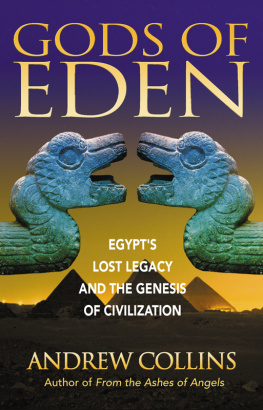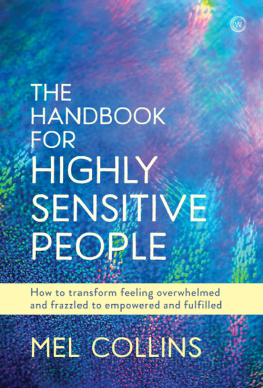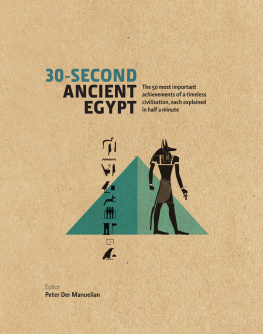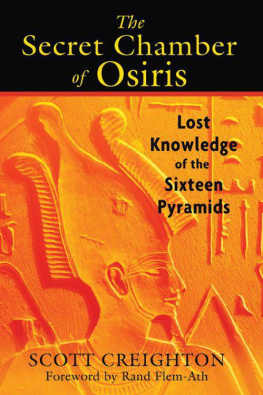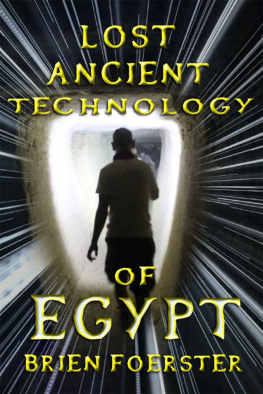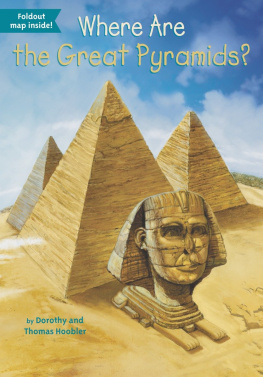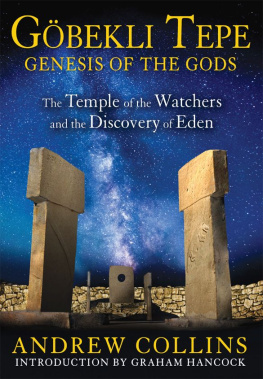GODS OF EDEN
In Gods of Eden Andrew Collins focuses his clear and steady eyes upon questions that haunt so many of us about ancient Egypt. Was the Egyptian civilization a development or a legacy? Did the ancient Egyptians possess advanced knowledge of sonar technology? What was the complicated relationship between ancient Egypt and the Near East? Each of these questions are taken up with fresh and powerful insights that have elevated Andrew Collins above so many other feeble attempts to make sense of the past. Here is an author to watch. Here is someone who is really interested in the truth and will take us there at all costs. If science as a whole had a dozen more thinkers of this courage and tenacity then we would all be celebrating the millennium in the warmth of a new golden age.
Rand Flem-ath, coauthor of The Atlantis Blueprint and When the Sky Fell
The research and writing of Andrew Collins invariably refocuses our attention on the key points in current enigmas about the rise of civilization and prehistory. Keenly sensing the challenge of what remains to be learned, Collins does not visit old ruts. Time and time again, he reaches beyond the known and pushes the envelope of inquiry as seen in Gods of Eden. The perspectives he is developing can contribute crucially to our common task of direction-finding in the uncertain future.
John Lash, astrologer, mythologist and author of Quest for the Zodiac
GODS OFEDEN
Egypts Lost Legacyand the Genesis ofCivilization
ANDREW COLLINS

Bear & Company
Rochester, Vermont
This book is dedicated to
THE PEOPLE OF TIBET
for keeping alive the flame of ancient wisdom
until it was so rudely extinguished in the 1950s.
May your unique world one day rise again,
like a phoenix from the ashes.
ACKNOWLEDGEMENTS
My sincere thanks go out to the following people who have helped in the creation of this book. They include Bernard, for inspiring me to investigate Gizas hidden chambers back in 1985; Nigel Appleby and friends, for confirming my findings in respect to Gizas Chambers of Creation; Debbie Benstead, for making the link between Egypts Elder culture and the Near East back in 1990; Mark Burkinshaw, for leading me to Nevali ori; Storm Constantine, for her invaluable help and continued friendship.
My thanks also go out to Lorraine Evans, for her research in connection with the Amun priesthood; Rodney Hale, for his constant help and dedication to my ongoing projects; Robert Hale, for his mathematical calculations regarding the Great Pyramid; Catherine Hale, for her German translations; Graham Hancock, Carrie Kirk-patrick, Lisa Munday and Matthew Adams, for their continued support and friendship; Mehrdad Izady, for his help in respect to Kurdish history; Nigel Jackson and John Sassoon, for their valued testimonials; Amber McCauley, for her French translations; Gareth Medway, for his assistance as a researcher and for checking my facts; Oren Patrick Purcell, for his contributions; David Rohl, for his advice, help and enthusiasm; Colin and Cathy Stallard, for the use of their photographs; Oliver and Danielle Stummer, for their thoughts and correspondence on sound technology; Jackie Pegg, for checking the manuscript and providing me with obscure articles on Egyptology; Graham Phillips, for understanding what I go through when writing a book and for his almost daily contact by telephone; Iben Lund Jrgensen and Dave Gladman, for the translation of Henry Kjellsons book; Peter Whitehead, for the use of his slide of the hawk-headed Horus statue in the Louvre, Paris; Wayne Frostick, Mark McCann, Steve Wilson and Caroline Wise, for reading the manuscript, and Matthew Goulding, Angela Reeve, Charles Topham, Johnny Merron and Boyd Lees, for their constant support.
I would also like to thank Lindsay Symons and Heather Holden-Brown at Headline and Simon Trewin, Luigi Bonomi, Laura Susijn and Emma Gibb at Sheil Land Associates for their part in the publication of Gods of Eden.
Lastly, I would like to say a special thanks to Simon Cox, David Southwell and Richard Ward for their invaluable research assistance. Without them this book would have looked a whole lot different.
Andrew Collins, 1998
Picture credits: Bernard G., pis. 39, 40, pp. 191, 209; Ufuk Esin, pi. 29; Harald Hauptmann, pis. 30-1, 33-5, 38, pp. 240; Harald Hauptmann & Rodney Hale, p. 270; Max Hirmer, pis, 1, 3; Kestner Museum, pi. 23; Theya Molleson & Stuart Campbell, p. 264; Mehmet Ozdogan, pi. 32; Petrie Museum, pis. 11, 12; Royal Geographic Society, pi. 27; Alan Sorrell, p. 252; Colin Stallard, pl. 7-8, 21; Billie Walker-John, pi. 22, p. 266.
Every effort has been made to trace and contact all copyright holders. The author will be glad to rectify any omissions at the earliest opportunity.

It is five oclock in the morning and the clear indigo sky glistens with an archway of stars. On the distant horizon the pre-dawn light eats away at the night and heralds the return of the sun on the day of the spring equinox a time of equal light and darkness and the midway point between the winter and summer solstices.
Towards the north-west is the diffuse yellow glow thrown up by the lights of modern-day Cairo its daily hustle and bustle and street chaos not yet begun but before us, on the edge of the Giza plateau, is arguably the most enigmatic carved monument in the world. It is a graceful leonine form with the face of a Pharaoh, a body of stone and a battered tail that curls around its hunched-up hind legs. Its extended fore legs reach out towards the eastern horizon as if to emphasise its integral relationship with the coming equinoctial sunrise. The world knows this monument as the Great Sphinx. It wears the same nemes head-dress as the dynastic kings that ruled the peoples of Egypt for over 3000 years.
Those academics who dedicate their lives and careers to studying the world behind such monuments tell us that the Sphinx was carved from an outcrop of bedrock by a school of dedicated stone sculptors during Old Kingdom times, the epoch of the pyramid builders. This great act had necessitated the hollowing out of a huge wedge-like enclosure, after which the fashioning of the enormous recumbent lion had taken place. A stone crown was then placed on its head, a beard was inserted into its chin and the face was chiselled into the likeness of a king named Khafre, who took the throne of Egypt in around 2550 BC.
Yet those Egyptologists who have made such strong assertions concerning the origins of the Sphinx are almost certainly wrong. As we move around the edge of its sunken enclosure, the ground-lights silhouette deep undulating grooves running around the monuments badly eroded body. They are curved and smooth and seem to have been caused by severe weathering over an enormously long period of time, even though the Sphinx is known to have been buried up to its neck in sand for at least 3300 years of its official 4500-year history. Here and there the deep horizontal scars are broken by sharp vertical fissures they are plainly visible all around the Sphinx and are also present on the interior walls of the Sphinx enclosure.
The Egyptologists tell us that these weathering effects were caused by the harsh desert winds that blow in from the south and engulf the leonine form in an elemental maelstrom. It is what they have always believed, and probably always will. Yet these people are not geologists; they do not study the composition and erosion of rocks. This is a pity, for geologists say something completely different about the poor condition of the Sphinx and its surrounding enclosure. They say that the deep horizontal scars and sharp vertical fissures were caused not by the desert sands but by water precipitation in other words, rain. Lots of it, over a very, very long period of time. One geologist, Dr Robert Schoch, an Associate Professor of Science at Boston University, Repeatedly, Schoch and his colleagues have demolished any criticism raised against their water precipitation theory, so much so that the Egyptologists are going to have to come up with something pretty convincing before any open-minded individual is going to take their argument seriously any more.
Next page
